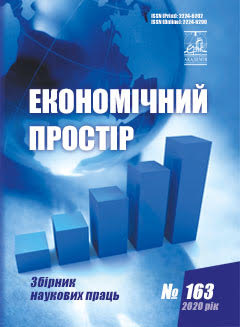DIGITALISATION OF THE NATIONAL ECONOMY: ECONOMIC AND SOCIAL CONSEQUENCES
Abstract
The article examines the positive effects and negative consequences of the digital transformation of the national economy in terms of waves of technological progress and the spread of innovation. It is determined that the development of the digital economy is the most obvious result of the wave-like nature of digitalization. A three-sector model of the digital economy is proposed, where the primary sector is its core and includes fundamental innovations (semiconductors, microprocessors), basic technologies (computers, telecommunications devices), stimulating infrastructure (Internet and telecommunications networks); the secondary sector includes services based on basic digital technologies, including digital platforms, mobile applications, and electronic payment systems; tertiary – a digital economy based on a wide range of digital products and services, including e-commerce and new activities or business models that are transformed as a result of digital technologies. A system of indicators has been formed that provides a quantitative interpretation of the economic and social consequences of the process of the digital transformation of the national economy. Such an assessment will help to understand the potential impact of digital transformation on economic growth, which is often uneven, both within the country and between countries with different levels of socio-economic development. This impact was considered in several parameters, including labor productivity, gross domestic product, value-added, employment, as well as for various components of the digital economy. Emphasis is placed on the fact that the net impact on the overall economy is difficult to assess mainly due to the imperfection of existing methods of assessing the digital economy. It was found that the most threatening consequences of the digital transformation are labor displacement, as the exponential change in technology leads to the use of robots, autonomous vehicles, sensors, artificial intelligence, the Internet of Things, changing the workflow towards greater flexibility with the predominant use of temporary labor. The types of work organizations that are likely to be part of the working ecosystem for at least the next 10 years are described.
References
Вишневський В., Вієцька О., Гаркушенко О., Князєв С., Лях О., Че-кіна В., Череватський Д. Смартпромисловість в епоху цифрової економіки: перспективи, напрями і механізми розвитку: монографія; В. П. Вишневський (заг. ред.). Київ: НАН України, Ін-т економіки пром-сті, 2018. 192 c.
Карчева Г.Т. Цифрова економіка та її вплив на розвиток національної та міжнародної економіки. URL: https://fp.cibs.ubs.edu.ua/files/1703/17-kgttme.pdf (Дата звернення: 12.03.2019 р.).
Турлакова С.С. Информационно-коммуникационные технологии развития «умных» производств. Экономика промышленности. 2019. № 1(85). С. 101–123. URL: http://doi.org/10.15407/econindustry2019.01.101
Mesenbourg T.L. Measuring the Digital Economy / US Bureau of the Census, Suitland, MD. 2001. Retrieved from https://www.census.gov/content/dam-/Census/library/workingpapers/2001/econ/umdigital.pdf
Хандій О.О., Шамілева Л.Л. Вплив цифрових трансформацій на економіку та сферу праці: соціально-економічні ризики та наслідки / Економічний вісник Донбасу № 3(57), 2019. – С. 181–188.
Єлісєєва Л.В. Вплив інформатизації та цифровізації економіки на трансформацію соціального капіталу / Ефективна економіка, 2019. – № 11. URL: http://www.economy.nayka.com.ua/?op=1&z=7429
Social and economic impact of digital transformation on the economy. URL: https://www.itu.int/en/ITU-D/Conferences/GSR/Documents/GSR2017.pdf
Bukht R and Heeks R (2017). Defining, conceptualising and measuring the digital economy. GDI Development Informatics Working Papers, no. 68. University of Manchester, Manchester.
Boudreau, J. (2016). Work in the Future Will Fall into These 4 Categories. Harvard Business Review. URL :https://hbr.org/2016/03/work-in-the-future-will-fall-into-these-4-categories
OECD Digital Economy Outlook (2017). URL : https://espas.secure.-euro-parl.europa.eu/orbis/sites/default/files/generated/document/en/9317011.pdf
Vishnevsky, V.P., Viietska, O.V., Garkushenko, O.M., Kniaziev, S.I., Liakh, O.V., Chekina, V.D., & Cherevatskyi D.Yu. (2018). Smart industry in the era of digital economy: prospects, directions and mechanisms of development. V. P. Vishnevsky (Ed.). Kiev: NAS of Ukraine, Institute of Industrial Economics [in Ukrainian].
Karcheva, H.T. The digital economy and its impact on the development of national and international economics. Retrieved from https://fp.cibs.ubs.edu.ua¬/files/1703/17kgttme.pdf [in Ukrainian].
Turlakova, S.S. (2019). Information and communication technologies for the development of "smart" industries. Econ. promisl., 1(85), рр. 101–123. doi: http://doi.org/10.15407/econindustry2019.01.101 [in Russian].
Mesenbourg, T.L. (2001) Measuring the Digital Economy / US Bureau of the Census, Suitland, MD. Retrieved from https://www.census.gov/content/dam-/Census/library/workingpapers/2001/econ/umdigital.pdf
Khandii O., Shamileva L. (2019). The impact of digital transformation on the economy and labor: socio-economic risks and implications / Ekonomichny`j visny`k Donbasu, 3 (57) URL: http://dspace.nbuv.gov.ua/bitstream/handle¬/123456789/161156/22-Khandii.pdf?sequence=1
Eliseeva, L.V. (2019) The impact of informatization and digitalization of the economy on the transformation of social capital / Efekty`vna ekonomika, 11. URL: http://www.economy.nayka.com.ua/?op=1&z=7429
Social and economic impact of digital transformation on the economy. URL: https://www.itu.int/en/ITU-D/Conferences/GSR/Documents/GSR2017.pdf
Bukht R and Heeks R (2017). Defining, conceptualising and measuring the digital economy. GDI Development Informatics Working Papers, no. 68. University of Manchester, Manchester.
Boudreau, J. (2016). Work in the Future Will Fall into These 4 Categories. Harvard Business Review. URL :https://hbr.org/2016/03/work-in-the-future-will-fall-into-these-4-categories
OECD Digital Economy Outlook (2017). URL : https://espas.secure.-euro-parl.europa.eu/orbis/sites/default/files/generated/document/en/9317011.pdf



